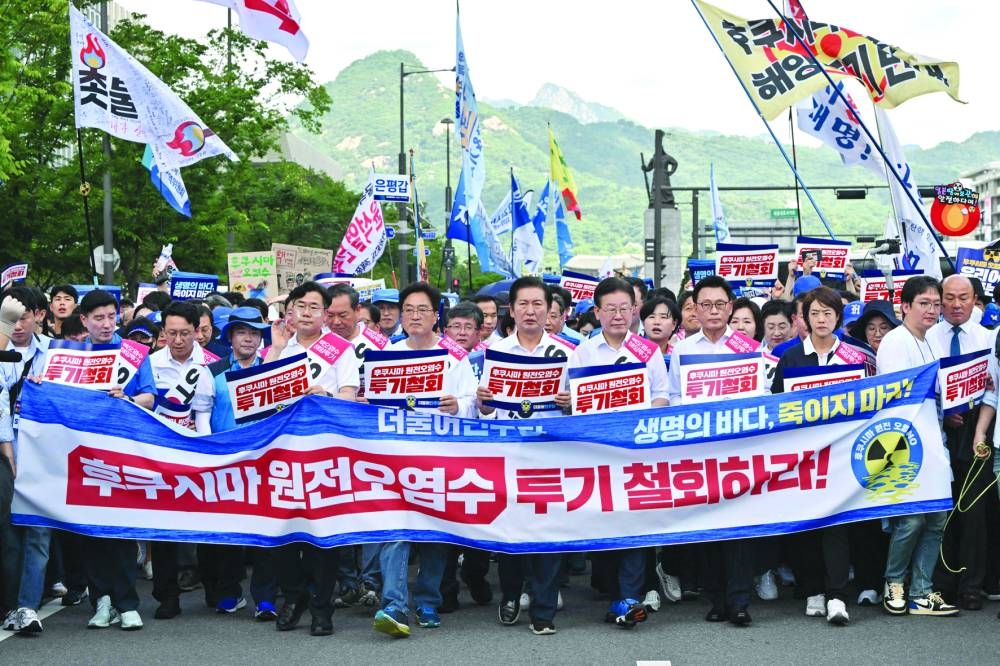Initial tests showed seawater radioactivity to be below detectable levels after the release of treated radioactive water from Japan’s Fukushima plant, its operator, Tokyo Electric Power Co (Tepco), said on Friday.
The seawater samples contained less than 10 becquerels of tritium per litre, the utility said, below its self-imposed limit of 700 becquerels. The World Health Organisation has a limit of 10,000 becquerels for drinking water.
A becquerel is a unit of radioactivity.
The released water is filtered to remove most radioactive elements except for tritium, an isotope of hydrogen that must be diluted because it is difficult to separate from water. Friday’s results came as the Nikkei newspaper said the government was preparing additional funding support for regional fisheries in the wake of China’s blanket ban on Japan’s aquatic products following the discharge of the water.
Chinese customs have not detailed the specific products the ban covers. Japan’s Fisheries Minister, Tetsuro Nomura, said the ban was “extremely regrettable” and ran counter to international trends, such as the European Union’s lifting last month of all import curbs related to Fukushima.
Nomura said the government would take measures to diversify Japan’s fish exports and develop new markets for China-dependent products, such as scallops. China took more than half of Japanese scallop exports in 2022, government figures show.
Japan exported about $600mn worth of aquatic products to China in 2022, making it the biggest market for Japanese exports, followed by Hong Kong.
Sales to China and Hong Kong accounted for 42% of all Japanese aquatic exports in 2022, government data shows.
More than 700 Japanese food exporters are affected by China’s suspension of seafood imports, a report by market research firm Teikoku Databank showed.
It said 727 Japanese companies export food products to China, making up about 8% of all Japanese firms shipping goods to the neighbour.
The report added that 316 Japanese firms export foods to Hong Kong, which announced its own ban on seafood imports from 10 Japanese regions after the Fukushima release.
South Korea also on Friday said it would sharply expand radiation testing of farmed seafood as demands grew from fishermen and the public to ensure safety.
More than 4,000 additional tests will be run at private institutions by the end of this year on farmed seafood products before they are shipped, Vice Oceans Minister Park Sung-hoon told a regular news briefing.
Experts will draw samples from fish farms for laboratory checks. No radiation has been detected since the tests began in late July, the minister said.
Japan says the water release is safe, adding that the International Atomic Energy Agency (IAEA) has concluded it would have “negligible” impact on people and the environment.
Japan’s environment ministry and TEPCO are doing tests of the seawater, while the fisheries ministry will run tests on fish in the area, with global nuclear watchdog the IAEA also on site to monitor the discharge and perform analysis.
China allies lead criticism of Fukushima water release
Suva, Fiji: China’s Pacific allies - from Solomon Islands’ government to Fiji’s opposition - on Friday echoed Beijing’s criticism of Japan releasing wastewater from its disaster-hit Fukushima nuclear plant.
More than 500 Olympic swimming pools’ worth of treated wastewater will be released into the Pacific over decades in a plan endorsed by the International Atomic Energy Agency (IAEA).
But China has issued a furious response, and its allies in the Pacific have backed that criticism despite safety assurances from Japan and the IAEA. Solomons’ Prime Minister Manasseh Sogavare - who has delayed elections and scolded Western powers while embracing Beijing’s chequebook diplomacy - issued a “strong statement against Japan’s decision”.
The water release, he said, “has an impact on our people, ocean, economy and livelihood.”
There was a similar message in the Fijian capital Suva on Friday, where a rare protest attracted hundreds. Demonstrators carried placards saying “Nuclear-free sea!” and “Pacific Lives Matter”. The protest was promoted by FijiFirst, an opposition party whose leader, ousted prime minister Frank Bainimarama, courted closer ties with China while in office.
The party accused Fiji’s government of “failing future generations by allowing Japan to dump its nuclear waste into our ocean”.
Other leaders appeared convinced by the safety assessments.
“Japan has reassured the region that the water has been treated,” said Cook Islands Prime Minister Mark Brown, who is currently chair of the Pacific Islands Forum, a regional bloc. (AFP)

South Korea’s main opposition Democratic Party lawmakers and party members march with a banner reading “Stop dumping Fukushima nuclear contaminated water into the ocean!” during a rally against Japan’s discharge of treated wastewater from the crippled Fukushima nuclear power plant, at Gwanghwamun Square in Seoul on Friday.
